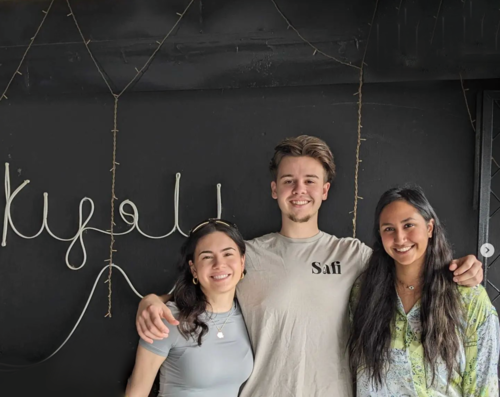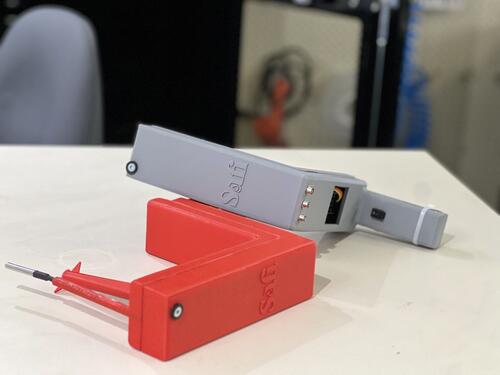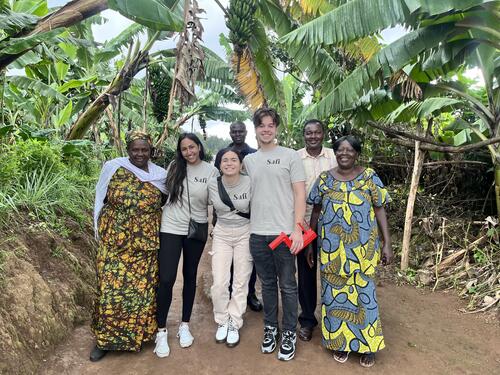
This is actually huge. i do wonder if the process itself can produce pasturized milk while even briefly retaining the volatiles in the milk. The raw milk can be brought directly to market and then be pasturized on demand like we now do coffee. This really matters.
Way more important though, the producers can now store the raw milk and only pastaurize as used or processed. please do note that milk is refrigerated for even days before it is picked up and processed commercially. Chilled milk will retain flavor.
It can now be pasteurized on demand plausibly retaining flavor. imagine starbucks pulling out a jug of raw milk and simpy putting this handle into the jug until the bell rings. You now have hot milk ideal for all sorts of drinks. I think it may get that easy.
Or now about making up a batch of cheese. you are already hot enough. go for it.
Waterloo students pilot portable milk pasteurization device in Rwanda
Startup Safi tapped entrepreneurial resources including Velocity and Math Innovation Office to bring their idea to lifeBy Melodie Roschman and Naomi GrosmanFaculty of Mathematics & Velocity
https://uwaterloo.ca/news/mathematics/waterloo-students-pilot-portable-milk-pasteurization-device
Waterloo student-founded company Safi – from the Swahili word for “pure” or “safe” – is a startup with an ambitious mission. They want to empower East African farmers to pasteurize milk cheaply and easily, with the ultimate goal of ending milk-transmitted disease. Today, Safi’s founders are working with governments, presenting at international conferences and preparing for a 300-unit test rollout in Rwanda. Two years ago, however, Safi was just an idea.
When the COVID-19 pandemic hit, Miraal Kabir, Daria Margarit and Martin Turuta — all classmates from the Math-Business dual degree program and good friends — felt helpless. Then, in early 2021, they saw an advertisement for Challenge4ClimateAction, a contest encouraging young entrepreneurs to address a climate change-related problem affecting the Global South. They decided to assemble a team and enter, though they weren’t sure yet which problem to address.

The Safi founders in Kigali, Rwanda: L-R: Daria Margarit, Martin Turuta, and Miraal Kabir
The pandemic had the friends thinking about a much deadlier coronavirus: MERS. Kabir grew up in Oman, where unpasteurized camel milk is a key transmitter of numerous diseases, including MERS and tuberculosis. Kabir knew from her time volunteering in Tanzania that unpasteurized milk is also a threat to public health in East Africa. Because of climate change, many farmers are switching to drought-resistant camels as their primary livestock, despite the high rate of pathogen transmission in camel milk.
While most East African countries have regulations requiring milk to be pasteurized at official facilities, the majority of milk sales are local and unregulated. Traditional pasteurization technology is prohibitively expensive ($700 to $800 CAD for a home unit), unwieldy and requires a lot of electricity. With these limiting factors in mind, the team proposed their product: an easy-to-use, cheap ($10 to 15 CAD), and fully mechanical device that would enable farmers to pasteurize milk consistently and accurately at home.
To their delight, they won the pitch contest, and Safi was born.
Building momentum with Velocity
In Spring 2021, Safi won first prize at the Velocity $5K pitch competition. Beyond receiving a financial boost, the development of Safi’s tech soared when they joined the Velocity community, enabling them to reach key milestones.
At Velocity Digital and Science spaces, the team could further build and test the pasteurization handles and received advisory from staff. They expanded their vision beyond the fully mechanical model, and prototyped battery-operated and corded models that would heat the milk for the user directly instead of simply monitoring temperature while paired with an external heat source.

The pasteurization handles are designed to fit on the side of any pot, whisk milk for even heating, and measure when milk is safely pasteurized.
“We used 3D printers to build the handles, which had been a hurdle for us, and we needed to quickly ideate and deploy a solution to create new iterations of the prototype,” Turuta says “That was really key because we had a very tight timeline and without Velocity, I don’t think we would have been able to get that finished product before leaving for Rwanda.”
The team was also evolving: some of the other original members had left Safi, and in March engineering students Filip Birger (McMaster University) and Noel Jakubik (University of Toronto) joined to help with R&D.
Funding the dream
Last fall, they were accepted into Validate Global, an Austrian business accelerator. Validate Global offered to send them to one of three African countries where they had connections with local NGOs to do field testing. They chose Rwanda, because, as Margarit explains, “Rwanda is huge on milk – they have a super developed milk industry and people even go to bars to drink milk!”
There was only one problem: the sponsorship from Validate Global wasn’t enough to cover the plane tickets from Toronto to Rwanda. After unsuccessfully trying to qualify for funding elsewhere, the team pulled a Hail Mary and emailed the Faculty of Mathematics’ dean, Mark Giesbrecht, asking for help.
He transmitted their request to the Math Innovation Office, where Stephanie Whitney, director for Research & Innovation Partnerships, immediately agreed to provide them with money for their plane fare from the Math Entrepreneurship Fund.
“Safi’s mission to combat global threats caused by climate change embodies the Waterloo at 100 strategic vision,” Whitney says. “This kind of initiative, which brilliantly combines technology and sustainability, encapsulates the purpose of the Math Entrepreneurship Fund.”
“The Faculty of Math is proud to have contributed to Safi’s important work,” Giesbrecht agrees. “We are committed to empowering students so they can realize their ideas and help create a better future.”
“It’s more like co-creating"
From April 21 to 28, Kabir, Margarit and Turuta were able to visit Rwanda to meet with government officials, NGO officers and local farmers and vendors. They were scared that people wouldn’t take them seriously because they were university students, but the response was immediate and overwhelmingly positive. On their first day, they met with the deputy general of the Ministry of Agriculture. As soon as they pitched the project to him, Kabir says, he got on the phone and started setting up meetings.
“They moved really, really fast,” Turuta reflects. Soon they were meeting with Rwandan dairy industry executives and inspectors, talking to manufacturers about how the tool worked, and making connections with farmers. “They set the tone that they are ready to partner with us and buy it from us.”

The Safi co-founders (centre, L-R: Miraal Kabir, Daria Margarit, and Martin Turuta) meet with Rwandan dairy farmers
Accompanied by representatives of Ripple Effect, a local NGO, they visited a co-op where they met some of the farmers who would benefit from their product. The excitement was palpable. Though they had to demonstrate their pasteurization handle with the help of a translator, “you could see the farmers’ eyes light up with pure excitement,” Margarit says.
"It’s more like co-creating. They have the knowledge and skills but maybe not the resources – so working together can create a huge impact."
Local officials also encouraged them to develop a model specifically designed for the kiosks where vendors sell farmers’ milk. Kabir emphasizes how much they learned in collaboration with farmers and officials on the trip, and how impressed they were by the “talent, the knowledge and the innovation already happening there.” The mission of Safi, she says, is not to show up and save people or tell them how to run things. Rather, “It’s more like co-creating. They have the knowledge and skills but maybe not the resources – so working together can create a huge impact.”
Building a better future
Now things are moving quickly. On the way home from Rwanda, the team stopped at the Enactus National Exposition in Montreal, where they nabbed a first prize yet again. This summer, as part of the E-co-op program, which allows students to work on their own business while earning co-op credit, Kabir is focusing full-time on Safi. The whole team is working to develop and test new versions of their pasteurization handle using the feedback they gathered on their trip.
They’re partnering with a local Rwandan manufacturer, REMCO, to put out a pilot run of 302 pasteurizing handles this September – and the deputy minister of Agriculture has invited them to present at a pan-African milk and dairy conference this fall. Just this week, they were accepted into Switzerland-based incubator, MASS Challenge, which will provide them with additional funding, as well as the ASME Innovation Showcase’s iShow, which will aid them in prototyping. They’ll be pitching at the international Enactus world cup in the Netherlands in October, and officials from Kenya, Uganda and Tanzania are interested in their own Safi pilots in 2024.
While Safi remains laser-focused on refining its portable pasteurization device and maximizing their new connections in East Africa, it hasn’t stopped the team from imagining different ways tech can be harnessed.
“One of the really important problems that Safi has identified is not just around milk pasteurization, but also how individuals in rural areas don’t necessarily have access to industrial level systems. We’re interested in essentially miniaturizing large industrial processes,” Turuta says.
“We’ve had the best past six months,” Kabir says, “but the [previous] year-and-a-half was a little slow. Getting into the startup space isn’t smooth sailing – but if you persevere, you can get that lucky break. Then it can go up from there.”
No comments:
Post a Comment